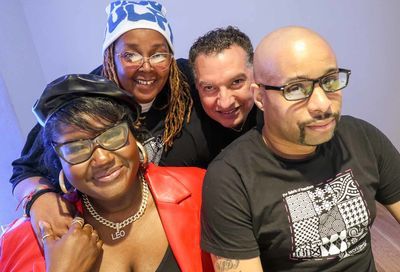Modern Marvel
'Thoroughly Modern Millie' at Kennedy Center, 'Our Lady of 121st Street' at Wolly Mammoth
How do you know when you’re having a good time at the theatre? You’re smiling ear to ear, from curtain rise to curtain fall, check. You happily hum the songs you’ve just heard during intermission and long after the actors take their final bows, check. You aren’t annoyed by an utterly contrived plot and its lack of any real antagonist for the main character, check. You don’t even mind the terribly tawdry “white slavery ” subplot that involves kidnapping orphaned young women and selling them to an Asian pimp called Buddha — check.
But you know you’re having a really good time at the theatre when you suddenly find yourself so transfixed with the spectacle in front of you that you are instantly transported center stage, singing and tapping your troubles away while the orchestra roars beneath you. And that’s the thoroughly wonderful magic that permeates much of Thoroughly Modern Millie, a dazzling sparkler of a show with high-stepping, toe-tapping dance numbers and music so infectious it’ll leave you yearning for the fashionable days of Cole Porter and the Gershwin brothers. The Roaring Twenties springs to life in full Technicolor vision through the bright, shimmering costumes of Martin Pakledinaz and flawless, articulate staging by Broadway’s own Superman, Michael Mayer.
 |
From the moment Millie Dillmount arrives in New York City, nestled among a stage-scale Manhattan skyline and belting her way through “Not for the Life of Me, ” we know our small-town gal will soon lose both her baggage and her naïveté. It’s 1922 and the dapper flapper aspires to be a “modern. ” As outlined by Vanity Fair, moderns marry money, so off our loveable ingénue skips to plot a foolproof plan to find a wealthy husband and the pot of gold at the end of the rainbow — too bad no one told her about the naughty leprechauns who already made off with the goods.
Once Millie saddles up to the Hotel Priscilla, a dicey Hell’s Kitchen joint run by the creepy Mrs. Meers, her plan quickly unravels as she tangles herself up in a whirlwind romance with Jimmy Smith, an urban rover who grants Millie her first taste of city life, and Mrs. Meers’ increasingly dirty laundry. And as with all great American musicals, everything winds up just ducky.
It’s no wonder that Millie was rewarded with six 2002 Tony Awards, including Best Musical. Jeanine Tesori and Dick Scanlan work in nine new songs in addition to two numbers from the original 1967 film and four standards from the ’20s, and the result is a buoyant score highlighting its title song along with an unforgettable new jingle, “Forget About the Boy. ”
|
The “Boy ” in this case is Jimmy, and as sung by Bryan McElroy, it may be best to forget about his consistently flat notes and lack of presence if not for the inarguably weakest link in Millie’s chain: Pamela Hamill as an overbearing and repellent Mrs. Meers. No matter — other lively performances redeem Millie‘s missteps in casting, from Anne Warren’s operatic Miss Dorothy to a largely animated Trevor Graydon by John Ganun. But no one is more glamorous than Stephanie Pope as a mesmerizing Muzzy Van Hossmere, the glittery diva who sells her “Only in New York ” number with all the power and muscle of a Wall Street tycoon.
And then there’s Millie. Darcie Roberts throws the sun up in the sky with her gleeful, carefully-modulated star turn first made famous by Julie Andrews. She is the feather in Millie‘s cap, tapping and flapping her way through Rob Ashford’s choreography, which features some of the most creative tap-dancing steps since Susan Stroman hit the scene with her inventive brand of work in 1992’s Crazy For You.
The rest of Mayer’s polished cast is left to convince you that this is the most fun you’ll ever have sitting still. And by evening’s end, you’ll be pleading “Gimme Gimme ” more Millie Millie.
If big buzzing musicals aren’t really your thing, then you can always strut a few steps north of the Opera House to the Film Theater for Woolly Mammoth’s prickly Our Lady of 121st Street. Stephen Adly Guirgis’ sharp dramedy spins a beautiful spider’s web of pop psychology, scathing humor, and dubious insight smack dab in the middle of Harlem. Sins are confessed, perceptions shift, and people are forever changed in Guirgis’ compelling story about a missing nun and the lives she touched.
|
Sister Rose’s death — and subsequent disappearance from her casket — serves as catalyst for the arrival of Guirgis’ clan of old friends and foes, who meet at the funeral home only to learn that their beloved teacher has vanished. Once the blame game gets underway, each schoolmate bares their own individual set of issues plaguing their lives now. Guirgis’ script is swollen with bloated egos and plenty of saucy speeches (crabby Victor asserts his disapproval with acidic lines such as, “demons should shit in his mouth daily “), which makes for sensational writing from the author of Jesus Hopped the “A” Train. And under the microscope lens of director John Vreeke, Our Lady is always engaging.
Vreeke’s terrific ensemble uses all available playing space, moving up and down all over the place in a constant rush of motion, much like the streets of upper Manhattan. And thanks to the traffic noises and music designed by Mark Anduss, it sounds as though we’re already there.
Woolly’s strength is always in its superb casting. Doug Brown is the center of catharsis for Guirgis’ storyline, and his portrayal of disc jockey Rooftop only solidifies his standing as an actor unafraid of emotional exposure. John Dow is perfect as a sympathetic priest who has suspended his trust in God, and Roseanne Medina is as deliciously caustic as her name — Nasty Norca — suggests. Craig Wallace is a standout with his tempered performance as the afflicted half of a gay couple, and Brian McMonagle is a riot as his partner, an “exceedingly gay ” actor from Wisconsin. McMonagle’s stereotypical, limp-wristed portrait earns him the title he is bestowed by Wallace as “Drama Empress. ”
Our Lady blunders when a mentally retarded little brother is played up in caricature form by the typically astute Mando Alvarado, and later when Guirgis prematurely wraps up an otherwise satisfying evening with his abrupt resolutions. With as much time and energy his audience invests in his absorbing characters, he never bothered to pen a sound conclusion for such an inspired play.
Support Metro Weekly’s Journalism
These are challenging times for news organizations. And yet it’s crucial we stay active and provide vital resources and information to both our local readers and the world. So won’t you please take a moment and consider supporting Metro Weekly with a membership? For as little as $5 a month, you can help ensure Metro Weekly magazine and MetroWeekly.com remain free, viable resources as we provide the best, most diverse, culturally-resonant LGBTQ coverage in both the D.C. region and around the world. Memberships come with exclusive perks and discounts, your own personal digital delivery of each week’s magazine (and an archive), access to our Member's Lounge when it launches this fall, and exclusive members-only items like Metro Weekly Membership Mugs and Tote Bags! Check out all our membership levels here and please join us today!



















